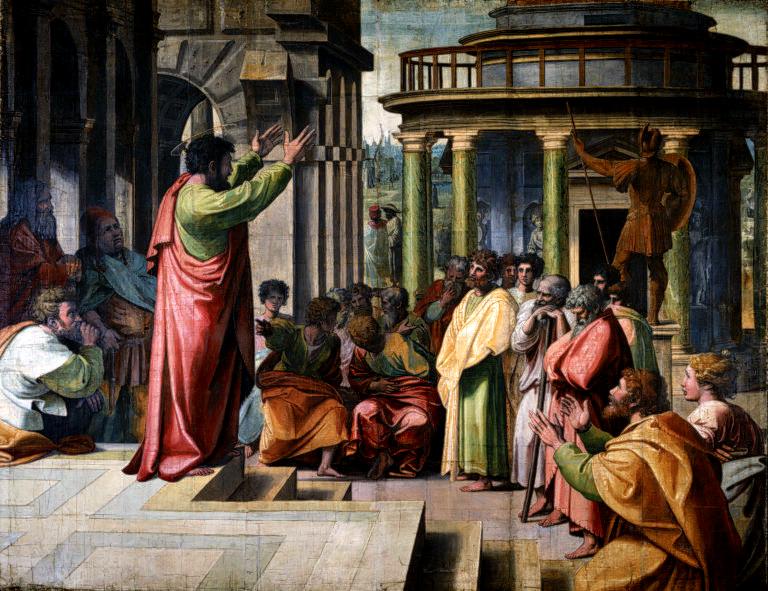 For most of the twentieth century Protestants rejected natural law, the idea that reason can discern basic moral principles coming from God. Protestants typically objected that Scripture emphasizes the inability of non-Christians to know God and therefore his law.
For most of the twentieth century Protestants rejected natural law, the idea that reason can discern basic moral principles coming from God. Protestants typically objected that Scripture emphasizes the inability of non-Christians to know God and therefore his law.
Today many Protestants are starting to see that natural law is more biblical than they had imagined. Thomas Johnson, J. Daryl Charles, Carl Braaten, Robert Benne, and Stephen Grabill are restoring to Protestant consciousness a way of thinking about God’s witness to the world that had been submerged during the twentieth century.[1] They are reminding Protestants of Paul’s declaration that “God has not left himself without a witness” among the pagans (Acts 14:17), and the apostle’s long statement about what those without God’s written law know of God’s law nonetheless.
When Gentiles who have not the law do by nature things required by the law, they are a law for themselves, even though they do not have the law, since they show that the requirements of the law are written on their hearts, their consciences also bearing witness, and their thoughts now accusing, now even defending them. (Rom 2:14-15)
That is the bright side. Those without the Bible know something of God and his law nevertheless. The dark side is that according to the Bible people tend to suppress that knowledge of God and his law. They pretend they don’t know what they really do know. This causes their minds to darken and believe that what is wrong is right. They do the wrong and approve of others who do the same (Rom 1:18-22). As the prophet Jeremiah wrote, the human heart is deceitful above all things. We don’t understand ourselves (Jer. 17:9). So while people know these truths deep down, they often deny it. But as J. Budziszewski puts it, although their hearts are made of stone, God’s carvings on those stones remain.[2]
Yet the apostles assumed pagans had this knowledge of God’s law. When they reasoned with Jews and god-fearing Gentiles who had been attending the synagogue, they argued from the Scriptures. But when they reasoned with pagans, they began with the testimony of creation, with the Gentiles’ sense of the insufficiency of their gods or their sense of law written on their hearts.[3]
For example, when Paul addressed Greek thinkers on Mars Hill in Athens (Ac 17.16-34), these were men and women who knew nothing about the Bible. Interestingly, Paul said not a word about justification or grace or salvation. Instead he spoke of judgment and the Judge whose role was proved by his resurrection from the dead. Paul was appealing implicitly to knowledge of their guilt against the moral law which he assumed was written on their hearts.
Notice that this is the same Paul who wrote to the Romans and the Ephesians about the noetic consequences of sin. He knew that sin had darkened the minds of these Greek philosophers. But he also appealed to their consciences, sensing that they could still hear something of divine law registering there and the consequent charge of blame. As far as we know from Luke’s telling of this encounter, Paul left his hearers with their guilt and his declaration that he knew who would judge them. Only implicit was the suggestion that there might be a way to avoid punishment by appealing to this judge. But like his teacher Jesus who told parables without explaining them, he left his hearers with an unsolved problem. Like Jesus, he probably assumed that those with ears to hear would come after him with more questions. And some apparently did, for Luke tells us there were at least four converts made by this evangelistic talk. Contrary to the conclusion of some scholars that this apologetic encounter failed, it was remarkably successful. It vindicated Paul’s assumption—and his inspired words in his letter to the Roman church—that pagans had God’s law written on their hearts.
[1] Thomas K. Johnson, Natural Law Ethics: An Evangelical Proposal (Bonn: Verlag für Kultur und Wissenschaft, 2005); J. Daryl Charles, Retrieving the Natural Law: A Return to Moral First Things (Grand Raoids: Eerdmans, 2008); Carl E. Braaten, “Natural Law in Theology and Ethics,” in The Two Cities of God: The Church’s Responsibiluty for the Earthly City, eds. Carl Braaten and Robert Jenson (Grad Rapids: Eerdmans, 1997); Robert Benne, Ordinary Saints—An Introduction to the Christian Life (Minneapolis: Fortress Press, 2003), 68-74; Grabill, Rediscovering the Natural Law.
[2] Budziszewski, Written on the Heart: The Case for Natural Law (Downers Grove: IVP Academic, 1997), 184.
[3] Ibid., 183.











